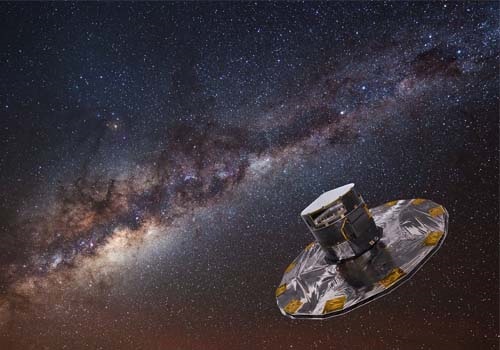For advancing how we investigate the fundamental nature of the Milky Way Galaxy, astronomer Jo Bovy has received the Rutherford Memorial Medal from the Royal Society of Canada (RSC).
“I'm very honoured to receive this distinction,” says Bovy, an associate professor in the David A. Dunlap Department of Astronomy & Astrophysics.
“While I work in an astronomy department and largely do research in astrophysics, one of the main motivations for my work is to expand our knowledge of fundamental physics — and in particular, of dark matter — using astrophysical observations. So it's very satisfying to receive an award from the physics community.”
The Rutherford Memorial Medal has been awarded annually by the RSC since 1980 in recognition of researchers in chemistry or physics in the early stages of their career.
"Jo Bovy is a marvel," says Roberto Abraham, chair of the David A. Dunlap Department of Astronomy & Astrophysics. "He and his students are helping to write the history of the formation of our Milky Way Galaxy, a central area of astrophysics that people have been arguing about for over a hundred years. And people will be talking about what Jo’s been finding for the next thousand! We’re all so proud to have him as a colleague."
“The Rutherford Medal is the most recent of many honours that Professor Bovy has received, and it is well deserved,” says Melanie Woodin, dean of the Faculty of Arts & Science. “The medal recognizes early-career researchers who have produced outstanding results, and his analytical methods and insights into our galaxy have been exceptional.”

Bovy is also the recipient of the Price Prize (2010), a Sloan Research Fellowship (2016), the Vera Rubin Early Career Prize (2019) and the Helen B. Warner Prize (2019). He is also a Canada Research Chair in Galactic Astrophysics.
Bovy received his PhD from New York University and joined U of T in 2015. He studies the origin, structure, composition and evolution of the Milky Way Galaxy, our cosmic home comprising hundreds of billions of stars, interstellar dust and gas, and dark matter.
Bovy conducts his research by developing new ways to analyze data about the positions and motions of stars in the galactic vicinity of the Sun. Today, this data comes primarily from the European Space Agency’s Gaia space telescope which is observing over a billion stars with unprecedented accuracy.
Currently, Bovy is using these measurements to better understand the small scale distribution of dark matter in galaxies. Dark matter is enigmatic cosmic stuff we can’t see with optical or radio telescopes but which we can detect because of its gravitational pull.
“Searching for clumps of dark matter is one of the topics I’m personally most excited about these days,” says Bovy. “And we think we've recently detected them for the first time.”
While on a large scale, dark matter is distributed evenly within galaxies and the universe, on a smaller scale — say a hundredth the size of a galaxy — astronomers expect dark matter to coalesce. These concentrations should then be detectable from the gravitational affect they have on the trajectories of stars.
“In my group's research,” says Bovy, “we combine astrophysical knowledge of the structure of galaxies, the detailed physics of stars, the inner workings of telescopes and the evolution of the universe, with techniques from machine learning and computer science to make sense of large amounts of data — all to better understand fundamental physical theories of dark matter.
“This variety of techniques is what first drew me to astrophysics,” he say, “and it continues to keep me excited.”

